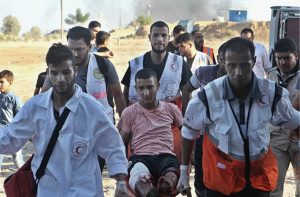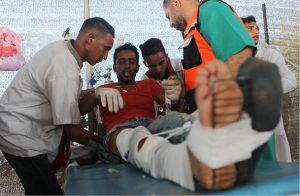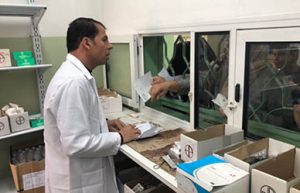Staying healthy has been a challenge for many Palestinians in Gaza. More than ten years of blockade have led to a grave deterioration of the social determinants of health: water from the aquifer is contaminated and unfit for human consumption; sewage flows largely untreated into the Mediterranean, increasing the risk of waterborne disease outbreaks; and the economy is stifled with unemployment rates of over 50 percent. Gaza’s most vulnerable face a daily struggle to meet even their most basic needs. Hospitals and clinics need to cope with chronic shortages of essential medicines and medical supplies, compounded by prolonged electricity cuts and insufficient fuel supplies for emergency generators needed to sustain life-saving services in intensive care units and operating theaters.
The Great March of Return has further aggravated the strain on Gaza’s health services. Since the start of the protests in March 2018, more than 29,000 people have been injured during demonstrations. More than half of those injured require hospital treatment. Over 6,500 gunshot injuries need complex surgical interventions and long-term rehabilitation. While these huge numbers of severely injured would overwhelm even well-prepared emergency services in the best-equipped health systems, they are an almost insurmountable challenge for Gaza’s crippled health system.
The continued influx of trauma casualties also affects the provision of other essential services, directly impacting capacities to provide neonatal and maternal care services and to manage noncommunicable-disease patients. Elective surgeries have to be postponed and suspended, hospital beds are reallocated and reserved for surgical patients, and health staff and ambulances have to prioritize the immediate emergency needs.
This overall context has also drastically increased the need for psychosocial support and mental health services: More than 50,000 people − half of them children − need mental health and psychosocial support interventions as a result of the exposure to violence and trauma; this comes on top of an estimated 210,000 − or more than 1 in 10 − people in Gaza who experience severe or moderate mental health problems.

The World Health Organization (WHO) and humanitarian health partners are working closely with the Ministry of Health and local authorities to mobilize support to address the most urgent health needs, prioritizing the poor and vulnerable. Supplies and equipment have been deployed to support the Ministry of Health and the Palestine Red Crescent Society in establishing and upgrading trauma stabilization points (TSPs) near the fence with Israel, so that the wounded can receive life-saving treatment close to the point of injury. The scope of interventions provided on-site at the TSPs has continuously expanded to cover triage, life- and limb-saving first aid, and initial treatment, and this has substantially reduced the burden on hospitals, with some 50 percent of the injured being treated and discharged at the TSPs. Work is progressing to provide WHO technical support to strengthen the different levels of the trauma pathway and to build and consolidate the capacity to manage trauma injuries and emergency cases.

Mental health emergency teams were trained to provide psychosocial and mental health support to the wounded, and collective efforts with the Ministry of Health, UNRWA, and other health partners aim to ensure that the teams are better equipped to deal with mental health emergency cases. Over 6,000 people have so far benefitted from mental health and psychosocial support services through community and primary care services.
Further humanitarian support is urgently required to scale up and sustain life-saving services and to enhance limb reconstruction capacity and rehabilitation services to prevent long-term disability. It is essential to complement the humanitarian interventions with strategic development efforts to build a resilient health system that is capable of addressing the persistent service gaps while responding to emergency needs.

The right to health − as promoted by WHO − is one of the fundamental rights of every human being. Palestinians, and especially those most vulnerable in Gaza, should no longer be deprived of this right.


